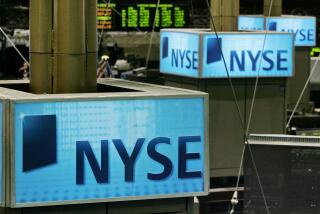It’s Pin-Drop Time on Foreign Markets
- Share via
Financial markets were closed Monday across the United States for Labor Day, forcing a ripple effect on some overseas trading.
Currency dealing in Europe was quiet, with one currency trader suggesting, “you could have heard a pin drop” in the dealing rooms.
The dollar closed at 1.7465 German marks in Europe, down slightly from Friday’s New York close of 1.7470 marks, but up a tad from its European opening of 1.7460 marks.
It was even more moribund against the Japanese yen, closing at 136.80 yen, unchanged from Friday’s New York close.
Crude oil prices were barely changed and trading was very thin. In late trading, London Brent crude oil futures for October were down 6 cents lower at $20.64 a barrel.
Britain’s stock market was the most active market, with the Financial Times-Stock Exchange 100-share index closing at an all-time high.
The blue-chip index jumped 33.9 points to 2,679.6, sparked by a Mori opinion poll that gave Prime Minister John Major’s Conservative Party a two-point lead over the opposition Labor Party.
Other European exchanges took a less optimistic view of the world and declined gently.
When U.S. markets open Tuesday, all eyes will be focused on the National Assn. of Purchasing Managers’ index of economic activity, due at 7 a.m. PDT. It is expected to post its third consecutive score above the crucial 50% mark, which indicates that the manufacturing economy is expanding. Economists polled by Reuters said they saw the August index rising to 52.7% from 51.8% in July.
Even more weight will be placed on the government’s August unemployment report, due Friday. A separate Reuters survey of economists’ forecasts shows expectations of a 22,000 rise in non-farm payrolls, with unemployment at 6.9%. In the July report, which may be revised, non-farm payrolls fell 51,000, and the unemployment rate dipped to 6.8% from 7% in June.
Many analysts believe that a poor report could nudge the Federal Reserve to lower interest rates to boost the economy.
More to Read
Inside the business of entertainment
The Wide Shot brings you news, analysis and insights on everything from streaming wars to production — and what it all means for the future.
You may occasionally receive promotional content from the Los Angeles Times.










